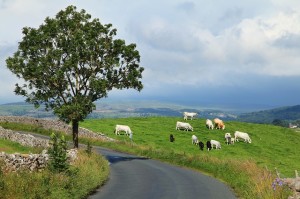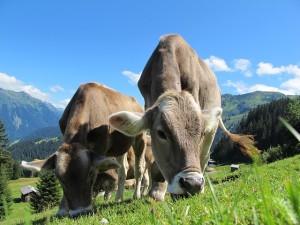Organic versus Non-Organic………..come and join the Continuing Debate
When we hear ‘organic’ the word healthy automatically comes to mind. After all that’s what organic means, wholesome and naturally produced. The best fuel for our body.
 What Is Organic Meat?
What Is Organic Meat?
Cows, chickens, pigs and fish raised on products without the use of chemicals or genetically modified stock feeds, are those deemed to be organic.
Organic meat is not a “mainstream” product, and not what ends up on most people’s dinner table as it is still considered a specialty item, although, it has grown enormously in popularity in the last few years.
Labeling and Seals
• 100% Organic – Products that have the Organic Seal must be 100% organic or produced from only organic ingredients.
• Organic – In order to use this label, products must be at least 95% organic.
• Under 95% – Those products that are at least 70% organic are allowed to place: “made with organic ingredients” on the label, but, they cannot use the Organic Seal.
Any foods that are less than 70% organic are not allowed to use the seal or any type of organic wording on their product labels, except mentioning specific items under the ingredients list.
The Organic Debate
For most people the choice comes down to price, since organic meat is much more expensive than non-organic. Some people believe it’s all a scam, and there is really no difference between the organic and non-organic products except for the price.
Also, many consumers just don’t want to hear how unhealthy their favorite cut of meat is so they choose to ignore the fact their favourite cut was raised with a dose of antibiotics, steroids, and hormones to ensure the animal from which it came grew as large as possible before the slaughter.
Big business would certainly like to keep it that way because farms that do adopt less organic ways to grow their product means bigger profits, which is why these manufacturers cringe every time the People for the Ethical Treatment of Animals (PETA) make headlines.
PETA activists may be onto something and are more than a bunch of fanatics who like to throw red paint on women who wear expensive mink furs.
Humans are not herbivorous unless they choose to be. Man has been eating meat since the dawn of time, but, the only way to serve the masses is to produce, produce, produce and unfortunately, that means altering the way animals are raised.
So the million dollar question is, is it unhealthy for humans to continue eating meat that is chemically altered or ‘not organic’?
People can recall the efforts of many celebrities such as Pamela Anderson who pointed a finger at KFC for its cruel and unethical treatment of chickens.
Paul McCartney and his former wife Linda were huge vegetarian advocates, but, little has been done to change people’s minds when it comes to their appetite. If that delectable slab of barbecue spareribs or that succulent fillet steak that came from a manufacturer who used steroids and genetically modified grains to help the animal grow faster than they it would have naturally, then the chances are people will close their ears so they can enjoy their food instead.
Urban legends have been circulating for years that adolescents are maturing faster because the food they’re eating has been altered with hormones. If the hormones used to ensure animals mature faster are the same hormones that are being ingested by humans and they too are maturing faster does it make for a compelling argument?
It’s certainly no secret that farmers use pesticides or what is commonly referred to as ‘bug spray’ to ward off pesky critters that can ruin wheat, corn or barley that is then used to feed the cattle, pigs or chickens which are eventually slaughtered, butchered and packaged to be sent to market for human consumption.
The Arguments for Organic Meat
Taste: Some people prefer the taste of organic and they say there is a noticeable difference between them and their non-organic counterparts. I lived in the bush for many years and we killed our own sheep and cattle for food, milked cows for our milk and kept chooks for our eggs and chicken meat.

They grazed in natural pastures which had never been exposed to any chemicals or sprays and back then the phrase ‘organic food’ had never been heard of.
Finding great tasting meat like that today is almost impossible although many of the farmers markets I go to now are offering some really great produce. Just speak to the farmer and ask him how he grew what he is offering for sale. You are sure to end up with something far superior to what you get in the supermarkets.
No Hormones: It’s been pointed out in more than one case study that pesticides are loaded with estrogen, but, has it not been touted for years that estrogen is good for women? In fact after menopause women are encouraged to take estrogen supplements because their body is no longer producing it.
But the fact is, too much estrogen is not ideal for the body, especially for women who eat a lot of meat.
Animals, such as, cows that are bulked up with food laden with pesticides and synthetic estrogen is then stored in human fat cells. The problem of course arises when these levels stored in fat cells rise to toxic levels. At this point, any of a number of maladies can ensue, such as, breast cancer and reproduction infertility in both men and women.
Of course meat that is organically nurtured has no estrogen hormones being administered, so that is perhaps one reason to make the switch.
Another consideration, a growth hormone referred to as “bovine growth hormone” is given to cows. This raises the possibility of increased chances of acquiring diseases like cancer.
No Antibiotics: Then there is the question of antibiotics being given to animals to keep them healthy enough to fight off disease. These same antibiotics can alter the nature of antibiotics less effective when the need for humans to fight off illness arises. Stories have also circulated for years that there is so much antibiotic added to meat products it “kills off” the “good” bacteria created by our bodies naturally.
No Additives and Chemicals: Organic regulations of food provide various bans and restrictions on the use of food additives, production aids and fortifying elements that are normally used in non-organic food. These include preservatives, food coloring, artificial sweeteners, artificial flavorings, and monosodium glutamate (MSG).
In reality, all of these things are chemically produced and so of course, the argument is strong that eliminating as much as possible of these items from one’s diet can at worst be harmless, but, at best is super healthy.
Good for the Environment: Another argument for organic is caring for the environment because organic growth practices reduce pollution, maintains higher soil quality and conserves water.
Arguments Against Organic Meat:
Cost: The main argument against organic is price. Many people, even those who can afford to pay a little more, refuse to pay the higher price for ‘organically grown’ meat.
There are a few factors determining the price difference but the biggest determinant is time. The time it takes the farmer to produce in bulk is less because the “tools” of the trade used to fatten livestock takes less time than the farmer who spends time to nurture their herds naturally. Time of course is money in any business.
Also people may not realize this, but, organic farmers have to be certified, which can be expensive when costs incurred include first-time certification, renewal of that certification, livestock and seeds purchased from “organic” sources, which also tend to be higher than those of non-organic farmers.
Then there is the land that has to be deemed “organic” and this may be difficult to comprehend but organic land costs quite a bit more to sustain than land that isn’t “deemed” organic, which is referred to as conventional land, which is where most farms are situated.
Sadly it comes down to price in many instances, but, if it’s affordable perhaps the wise decision is to give organic meat products a try. If nothing more it is probably healthier, though no definite scientific research exists to date that validates that claim.
Personally, I only eat grass fed beef (which is now widely available) and find this meets the happy medium between grain fed and organic…….plus it has the best flavour by far. For the other varieties of meat I go for anything that can be proven to be free range.
In conclusion I would like to draw to your attention to the fact that the bigger percentage of meat these days (this includes beef, chicken, pork and dairy cows) has more than likely been fed some type of genetically modified stock feed and as you are probably well aware by now GMO foods are certainly being avoided by the health conscious folk in our community.
Genetically modified food has become a fact of life and appears to be everywhere now days so I thought it might be a good time for you to brush up on your awareness on 20 of the worst GMO Foods and ingredients to avoid. You and your family are probably eating many of these foods right now and don’t even realize.
If you live in the US this is extremely important health information for you to read as it is quite a horrifying list. For those of you living Down Under, read it as well because we are only one step away.
And lastly, white cottonseed a supplementary feed used in Australia (and in many other parts of the world) comes from genetically modified seed and at this stage the commodity beef markets have no known restrictions in place.
I hope this helps you on the way to better health and fitness.
Leave a Reply